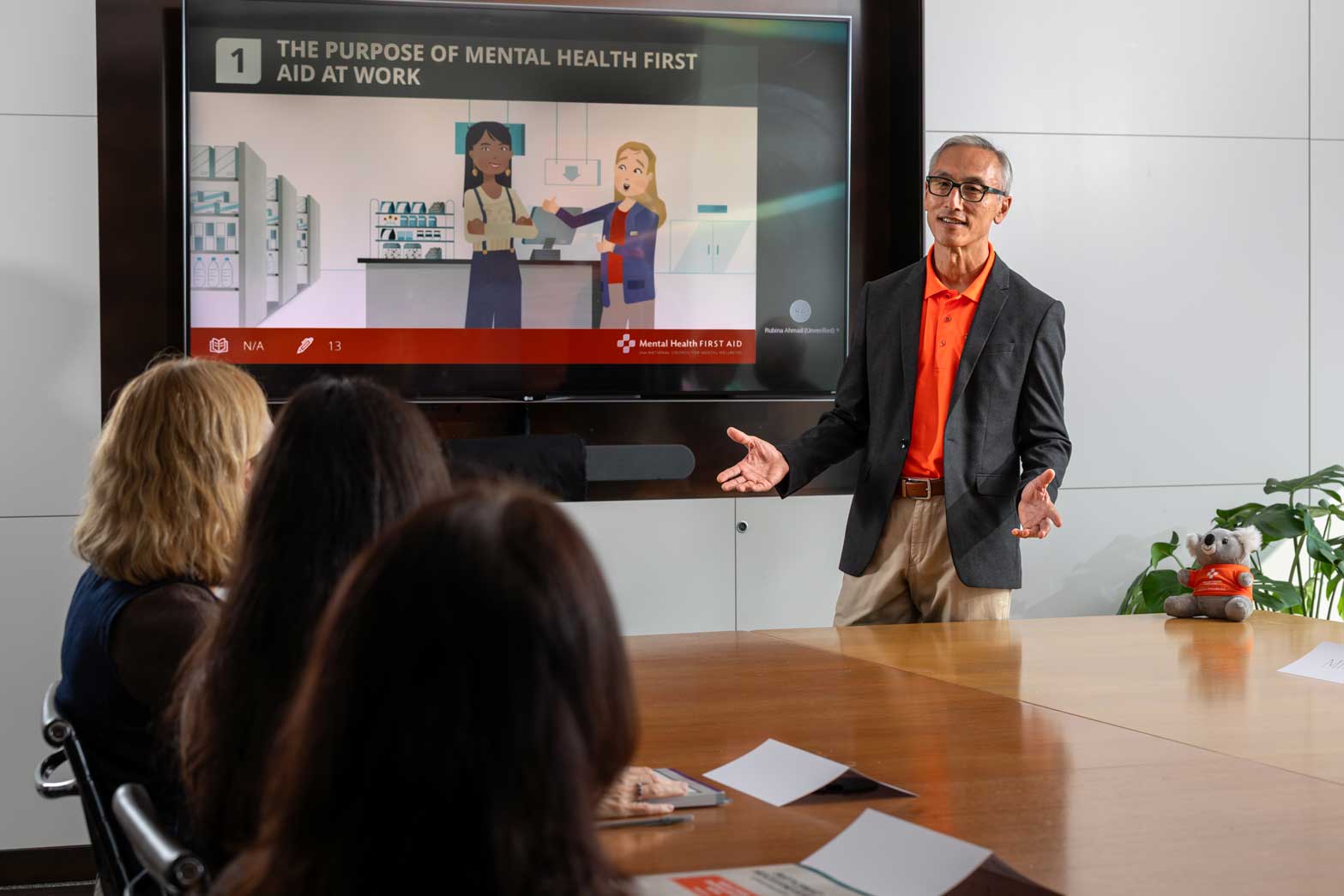Safety is paramount on the manufacturing work floor. No matter what the job is, getting workers home safely is always more important than getting the product out the door. However, that care might not always extend to workers’ mental health.
We sat down with leaders from two organizations, Daimler Truck North America (DTNA) and Nucor Corporation, to discuss how they prioritize workers’ safety with Mental Health First Aid (MHFA).

Jonathan Rasmussen
Training and Documentation Manager
Daimler Truck North America

Hollie Frye
Product Group Safety Manager
Nucor Corporation
Mental Health Challenges in Manufacturing
Any given manufacturing shift comes with a range of challenges not experienced in other workplaces. Physical demands, temperature changes and high-stress environments are the norm. And because of the constant demands of the manufacturing industry, inconsistent schedules and overnight shifts can be routine.
The manufacturing industry ranks as one of the unhealthiest for workplace mental health, and the turnover rate within manufacturing is 33% higher than the national average.
Jon Rasmussen of DTNA said there are two major blocks to mental health care in manufacturing: lack of awareness about mental health care and resources, and the stigma around discussing it at all.
“The pain and discomfort [of physical demands] can drive people to self-medicate, and you may not be able to see a doctor in the hours you need to because you’re on the off shift,” Rasmussen said. “But there are things we can do as employers, leaders and coworkers [to] continue to combat the stigma around mental health and substance use.”
Hollie Frye of the Nucor Corporation agrees. “There’s an old saying, ‘leave it at the gate,’ and that just can’t happen anymore,” Frye said. “Our teammates need more from us.”

Why Mental Health Training for Manufacturers Is Needed
Mental health education like MHFA at Work helps workers to bring their whole selves past the gate — and once they’re inside, to spread awareness about vital resources like Employee Assistance Programs and mentorship.
Frye emphasized that the primary goal of any manufacturing workplace is always to ensure employees get home safely each day. Nucor and DTNA are maintaining that mission for mental health safety, too.
“It’s a very active environment,” Frye said. “If you’re not on your best game, you’re putting yourself and your peers at risk. We want to make sure that our leaders are equipped to recognize stress and anxiety, and that they’re doing regular check-ins.”
Regardless of the shift an employee works, Rasmussen and Frye say the jobs can often be isolating. Because a manager or shift lead may be the only person an employee talks to during the shift, it is imperative that leadership knows how to have open conversations about mental health.
“It is my personal opinion that MHFA should be required and encouraged for everyone, but especially for leaders with direct reports.”
– Jon Rasmussen
Mental Health First Aid at Work for Manufacturing
After two deaths by suicide at the Detroit branch of DTNA, leadership in Detroit took MHFA at Work. From there, it spread through the company. The first Nucor branch to begin taking MHFA was in Crawfordsville, Indiana, and the company has now trained over 1,400 employees.
“It is my personal opinion that [MHFA] should be required and encouraged for everyone, but especially for leaders with direct reports,” Rasmussen said. “You need to be able to identify, communicate and be comfortable talking to people, especially in a crisis. You can’t be intimidated by that.”
Both Frye and Rasmussen emphasized the importance of leadership buy-in for mental health initiatives like MHFA. Frye cited Leo Topalian, Nucor’s CEO, on the importance of “whole-person safety” — caring for mental health and safety just as much as physical health and safety. Similarly, Rasmussen repeated the words of DTNA CEO John O’Leary: “Great leaders express vulnerabilities.”
Rasmussen added, “When leadership sets the standard and they share these things, it really moves the needle, and people feel safe to express their own self.”
Workforce leaders might invest in mental health education like MHFA because of its return on investment: the increased productivity and quality that results from whole-person safety. But Rasmussen sees it as much more than just another cog in the machine.
“Some things are less about returns and more about just doing what’s right,” he said. “It’s simply the right thing to do to take care of yourself and to care about others, especially when you have a responsibility as a manager — and just as a human being — to make the world a better place.”
Nucor Corporation and Daimler Truck North America are finding their return on investment by doing the right thing: creating whole-person safety.
MHFA is more than just a training. When we invest in mental health, we build stronger teams, safer floors and better futures.
Bring whole-person safety to your organization by investing in Mental Health First Aid at Work for Manufacturing today.



